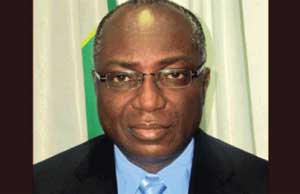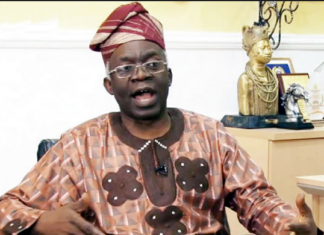More than 30 per cent of eligible voters may be disenfranchised by the Independent National Electoral Commission (INEC) in the ballot next month.

The INEC has not printed their Permanent Voter Cards (PVCs), a crucial voting document, even as the election is 27 days way.
Up to 30 per cent of the PVCs are held up in China where they are being printed, according to findings by TheNiche.
The INEC recently released a list containing 68,833,476 voters who are eligible to vote, fewer than the 2011 figure of 73.5 million.
Of the 68,833,476 prospective voters, 30 per cent may not have their PVC’s ready before February 14, the day of the presidential poll, according to sources close to the INEC.
Time and space constraints
The commission is constrained by time and pace to meet up with the PVCs production. Section 20 of the Electoral Act says: “The supplementary voters’ list shall be integrated with voters’ register and published not later than 30 days before a general election.”
Going by the Act, the INEC has to publish the voters’ register on January 13, even though it has yet to get its act together, especially in issuing PVCs to newly registered voters.
The debacle in printing the PVCs is in addition to the shoddy manner the INEC bungled the distribution of the last PVCs in many states. More than half of Lagos residents were unable to collect theirs.
Unless things are sorted out in local INEC offices before January 31, a large population in Lagos will not be able to vote on February 14 and 28.
The story is the same in other parts of the country.
In other states, many residents who trooped out for their cards were also disappointed because INEC staff had no explanation for why their cards were missing.
It prompted the House of Representatives to direct the INEC to allow eligible Nigerians with temporary voter cards to vote.
Clarification by INEC
But Kayode Idowu, spokesman for INEC Chairman, Attahiru Jega, said the commission will not shift ground on the use of PVCs for the election. “As far as I know, that policy (using PVCs to vote) is not going to be reversed,” he maintained.
He denied that 30 per cent of PVCs have not been printed. “Where did you get that information? As far as I know, it is not true. I am not saying they (PVCs) have been printed. They are being printed and will be ready before the election.”
Why use PVCs?
Another source familiar with the voting system wondered how the INEC would be talking of using PVCs and card readers in a voting system that is largely manual based.
“The arrangement (PVCs) was made in 2006 to print the cards locally. Through a PPP (Private Partner Partnership), the cards were printed in Abuja without fanfare. Nigeria had the biggest card printing facility in the whole world by Chams by 2007.
“The use of PVCs was not made compulsory then and the use of card readers was not introduced because they are components of electronic voting system. It is actually laughable to use card readers for manual voting system,” the source said.
However, speaking on Africa Independent Television (AIT) on Friday, January 16, Idowu confirmed that not all the PVCs have been received from where they are being printed, which he did not disclose.
But he said the INEC intends to take delivery of the remaining PVCs by January 24, all other things being equal.
Chinese connection
TheNiche learnt that the printing of the PVCs is being done in China, a major reason the Department of State Security Services (DSS) suspected that the All Progressives Congress (APC) may have reached out to the printing company to enable it hack and clone voters’ cards.
On November 24, 2014, the DSS broke into the APC’s office in Lagos on the allegation that it was planning to hack and manipulate the database of the INEC.
TheNiche later learnt that the reason for the suspicion was because a chieftain of the APC, has a business relationship with a big company in China which has a huge interest in Nigeria.
Experts fault DSS
Information communication experts have since faulted the DSS, saying no one can hack what is not online and since the INEC database is offline, it would be impossible for the APC to hack its server.
The INEC had finally resumed the distribution of the PVCs after four years of waiting. The exercise began in 2011 with Temporary Voter Cards (TVCs) which the INEC promised would be replaced with PVCs before the 2015 elections.
According to the INEC, 68,000,000 voters are registered on its database and as such the distribution would be done in phases.
Distribution in phases
The first phase began in May 2014 in 10 states – Taraba, Gombe, Zamfara, Kebbi, Benue, Kogi, Abia, Enugu, Akwa Ibom and Bayelsa.
The second phase include Yobe, Bauchi (North East) Jigawa, Sokoto (North West), the Federal Capital Territory, Kwara (North Central), Anambra, Ebonyi (South East), Ondo, Oyo (South West), Delta and Cross River (South South).
The exercise was scheduled initially for July 18 and 20 but was later postponed to August 15 and 17, 2014.
The final and third phase kicked off in November and involved 13 states – Lagos, Kano, Rivers, Adamawa, Borno, Edo, Imo, Kaduna, Katsina, Nasarawa, Niger, Ogun, and Plateau.
Complaints, controversies
But while the exercise lasted, it was trailed by controversies and shoddy preparation by the INEC.
In Lagos, the distribution began poorly on November 7, which made the state government to raise an alarm that it was intentional to disenfranchise the Lagosians.
The distribution, initially scheduled for between November 7 and 9 in the state, was carried out in only 11 of the 20 councils, and billed for November 28 to 30 in the remaining nine councils.
This and other complaints reverberated in other states.
One of the common complaints in some polling units was either sluggishness by INEC officials who would not arrive early or people’s pictures appearing on the list without their PVCs.
Bribery allegation
There were allegations of bribery in some areas, especially from those trying to take part in Continuous Voter Register (CVR) meant for those who have newly attained the voting age of 18.
Those seeking their PVCs at centralised points were not spared as INEC officials allegedly capitalised on the large crowd to demand for N200 and above before attending to them.
The concern expressed by many Nigerians who are yet to get the PVCs prompted the House of Representatives to direct that the INEC should allow the use of TVCs so as not to disenfranchise eligible voters who registered in 2011 but could not obtain the PVCs this year.













